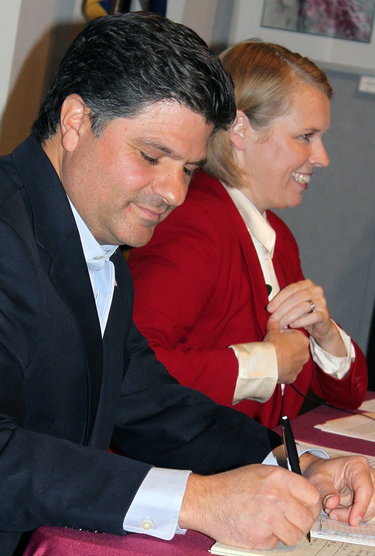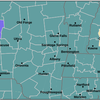In wake of tax hikes, Fahy and Amedore propose legislation on state-set equalization rates
ALBANY COUNTY — The state legislators representing Guilderland have written to the governor asking for changes in how the state-set equalization rate is handled.
This fall, Guilderland residents who live outside the Guilderland School District saw huge jumps in their school taxes because Guilderland’s equalization rate dropped from 88 to 76 percent.
The New York State Department of Finance and Taxation explains the Guilderland tax increase:
“Each year the market value of property changes. In other words, the amount that a property can sell for varies from one year to the next. In addition, the market value doesn’t change at the same rate for all properties. For example, the value of some types of industrial properties could be falling while the values of residential properties may be increasing.
“In the case of Guilderland, the Tax Department determined that the overall market value of the town increased. A reduction in the equalization rate indicates that the overall market value of property is increasing relative to the assessed value of the property.”
Guilderland residents in the Mohonasen School District saw a nearly 19-percent tax hike; in Schalmont, nearly 17 percent; in South Colonie, over 12 percent; and in Voorheesville, close to 12 percent.
Guilderland residents will see similar disparities when county taxes come due.
The Guilderland residents in the Voorheesville School District have been vocal about their complaints, voicing concern to the town board and the Voorheesville School Board.
“We are trying to focus on solutions,” Superintendent Brian Hunt told The Enterprise. “Assembly member Fahy and Senator Amedore are going to propose legislation in January to address some of the issues.”
Assemblywoman Patricia Fahy and Senator George Amedore are exploring legislative changes, including:
— Requiring the Office of Real Property Tax Services to finalize appeals of equalization rates sooner.
Guilderland’s appeal of the state-set equalization rate was not finalized until a little over a week before tax bills were sent out, “leaving taxpayers (and us as legislators) blindsided by this increase,” according to a letter that Fahy and Amedore sent to Governor Andrew Cuomo.
— Using separate, segmented equalization rates for the parts of Guilderland in the Voorheesville Central School District, until a town-wide revaluation is completed, which the Guilderland town board has committed to completing for the 2019 tax roll. Guilderland hasn’t revalued on a town-wide basis since 2005.
“What appears to have thrown off the town-wide equalization rate, is the assessment of commercial properties,” said Hunt.
“Only eleven commercial properties were used in samples for the purposes of setting the equalization rate (out of 405 commercial properties). The Office of Real Property Tax Services commercial rate means that the value of the town’s commercial property increased by a whopping 35% in two years (while the nationally reported trend is only 1 to 2%),” Fahy and Amedore’s letter said.
The part of Guilderland that lies in the Voorheesville school district “looks quite a bit different from the Guilderland school-district piece of Guilderland,” Hunt said.
“The majority of our piece of Guilderland is residential,” Hunt said. “With a segmented rate, we could end up with a little better treatment.”
Properties in the respective school districts aren’t a reflection of the entire town, said Jake Egloff, communications director for Fahy. Preliminary estimates from the Department of Taxation and Finance indicated that if all other factors held constant, the equalization rate would increase — which would bring down taxes, he said.
The segmented rate “would have brought a savings of 5 percent, or so, off of the increase” that residents saw in their taxes, said Amedore.
The segmented rate would apply for the portions of Guilderland in the Mohonasen and Schalmont Districts as well.
— Requiring that taxpayers be given advance notice of major changes in their equalization rates.
Senator Amedore told The Enterprise this is “a transparency and accountability approach.”
“No one was made aware of this [the increase] until they opened up their mailbox, and pulled out their tax bill and were surprised by the very large increase,” Amedore said.
“It would notify affected residents,” he said. “People would get a heads-up, and [be able] to talk with the assessor, talk with the supervisor, talk with school and town board members, and ask their questions: ‘Why? How come? What’s going on?’ Instead of doing it after the fact, like what happened,” with Guilderland residents.
The Enterprise called the governor’s office for comment and received an emailed response that said only: “We are reviewing the letter and will do the same for any legislation that eventually is introduced regarding this issue,” wrote Michelle Nicoll-Rosales, deputy director of communications for economic development for Cuomo.
Asked about having a single, statewide standard for assessments and requiring towns to perform valuations more regularly could solve the issues associated with the equalization rate, Egloff said it is, politically, too difficult.
“The idea that has been tossed around the legislature … Unfortunately, it’s proven, politically, to be unpopular with homeowners, in particular. They look at us and say, ‘I don’t want my taxes to go up every single year and get reassessed all the time.’ It’s proven to be a politically difficult lift in that case,” Egloff said about performing regular valuations.
On a statewide standard for assessments, Amedore said, “There are other states that do it differently … We, in the state of New York, have a ‘home-rule’ approach, and we respect home rule. And, I think, keeping things very local, is best,” said Amedore.



